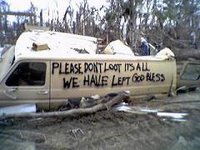
Katrina:
Looking Back/Looking Ahead
From an NPR wrap-up of 2005 by Ron Elving:
Katrina will surely be a milestone of the first order for the Gulf Coast and for millions who were directly affected. But will it reverberate beyond? In the fall, some predicted that the scenes of horror from New Orleans would spawn a reconsideration of race relations and a new era of concern for the nation's underclass. If that's happening somewhere, it's not apparent in Washington. An initial surge of sympathy has ebbed, and the victims are finding out the degree to which they're on their own.
Katrina was also set forth as a potential turning point for the Bush presidency, the moment at which his re-election momentum disappeared and disappointment overtook his second term. But by year's end, Mr. Bush was battling back in the polls and showing signs of resilience on the issues. Looking forward, Katrina's historical and political legacy is uncertain.
There is no doubt that the American public's collective jaw dropped after seeing the quality of FEMA's Hurricane Katrina response. The shocking realization that New Orleans was worse off than many third-world places hit by natural disasters caused 'Heckuva-job Brownie' to be replaced by a far more efficient and capable Coast Guard Vice Admiral Thad Allen. American citizens proved that they were a compassionate and generous people by sending billions of dollars in charitable contributions to the victims of the hurricane. Over this Holiday season, 38,000 families remained in hotels rooms nationwide - waiting to return to what once was home - and facing an uncertain future. The Bush administration still has a long way to go to fulfill the promises they have made to restore the city of New Orleans - and to retain the character of the city rather than gentrifying it or making it just another opportunity for corporate-cronyism. Beyond the chatter about the rebuilding efforts lies the reality of Two Americas. Some things in New Orleans may change, but for the millions of Americans who are among those living below the poverty line and the working poor, nothing will change unless we remember their human faces.

It seems that it's harder to motivate ordinary citizens to respond to a disaster that is as entrenched - albeit invisible - as poverty. It is a condition that clearly existed in New Orleans before Katrina blew the curtain away to reveal poverty's human face. In the case of New Orleans, the majority of those faces were those of African Americans, but poverty is not racially exclusive or selective. Poverty exists in urban America and rural America and in every corner of each American community. One thing that cannot be denied, however, is the fact that we met the face of poverty in New Orleans last September.
Will Americans remember that, just as important as rebuilding the Twin Span bridge from New Orleans to Slidell, Louisiana, that we need to do the hard work of building real and lasting bridges out of poverty? See my post titled "The Helping Hand":
EXCERPT:
Bishop Jakes spoke about the Twin Span Bridge that connects Slidell, Louisiana to New Orleans which was partially submerged by Katrina and will need rebuilding. He called it a symbol of our need to rebuild bridges between our ideas, our perspectives, and our differences - we must build unity. "We can't multiply by dividing and we can't add by subtracting," said Bishop Jakes. If we rebuild that bridge with unity, it could make a real difference, letting go of the divisive illusion that we're black or white; Democrat or Republican; "right" or left." The true vision, he said is "One nation, under God, indivisible, with liberty and justice for all."
Will the realities of Katrina continue to reverberate beyond the Mississippi Gulf Coast?
